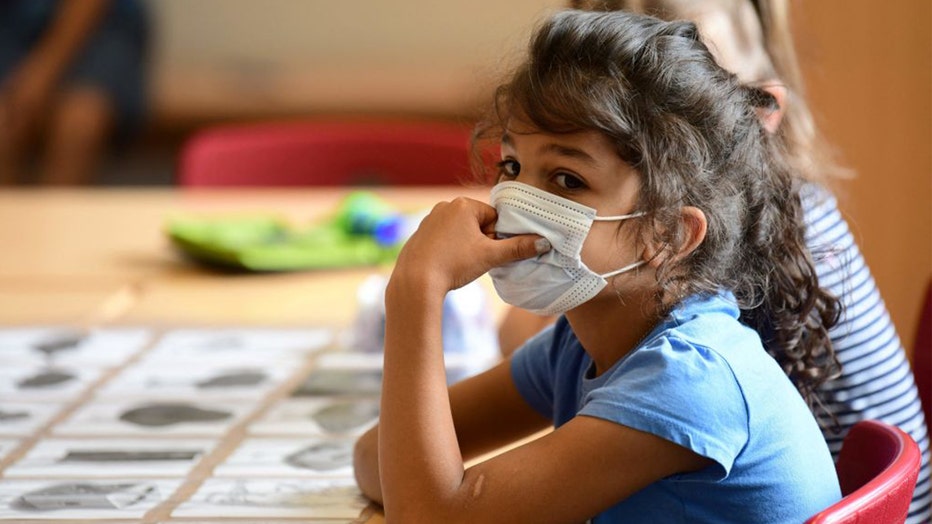AAP: Students, staff should wear masks in schools — regardless of vaccination status
The American Academy of Pediatrics released a set of recommendations for students and staff ahead of the approaching school year on Monday which included "strong" support for in-person learning, but urged both teachers and students to wear masks in classrooms — regardless of their vaccination status.
The AAP recommendations encourage all eligible people to get their COVID-19 vaccine and mask-wearing for anyone older than 2 years, which echoes the U.S. Centers for Disease Control and Prevention’s updated guidelines for schools announced on July 9.
The academy said getting children back into schools and learning alongside their fellow students and teachers was the top priority and that "we all play a role in making sure it happens safely."
"The pandemic has taken a heartbreaking toll on children, and it’s not just their education that has suffered but their mental, emotional and physical health. Combining layers of protection that include vaccinations, masking and clean hands hygiene will make in-person learning safe and possible for everyone," said Sonja O’Leary, MD, FAAP, chair of the AAP Council on School Health.

FILE - A student wears a mask while listening to her teacher. (INA FASSBENDER/AFP via Getty Images)
RELATED: As COVID-19 cases rise in US, surgeon general expresses worry
The AAP is strongly recommending mask-wearing due to a large proportion of students being ineligible for the COVID-19 vaccine, which the U.S. Food and Drug Administration says will not be available to children 12 and under until later this year.
"There are many children and others who cannot be vaccinated," said Dr. Sara Bode, chair-person elect of the AAP Council on School Health Executive Committee. "This is why it’s important to use every tool in our toolkit to safeguard children from COVID-19. Universal masking is one of those tools, and has been proven effective in protecting people against other respiratory diseases, as well. It’s also the most effective strategy to create consistent messages and expectations among students without the added burden of needing to monitor everyone’s vaccination status."
Citing a slew of recent COVID-19 outbreaks linked to summer camps throughout the United States, AAP is recommending schools adopt preventative health measures as well as build a solid approach to address mental health and providing timely COVID-19 testing access.
Summer camp outbreaks "certainly could be a precursor" to what happens when youngsters return to classrooms in the fall, said Dr. Michelle Prickett, a pulmonary and critical care specialist at Northwestern Memorial Hospital in Chicago. The outcome will depend on vaccination rates and which virus variants are prevalent, she said.
RELATED: COVID-19 vaccines for children under 12 likely approved later this year, FDA says
"We just need to be vigilant," Prickett said.
In recent weeks, summer camp outbreaks in Texas, Illinois, Florida, Missouri and Kansas have spread to the broader population.
The clusters have come as the number of newly confirmed cases of the coronavirus in the U.S. has reversed course, surging more than 60% over the past two weeks from an average of about 12,000 a day to around 19,500, according to data from Johns Hopkins University.
Additionally, many studies have suggested pandemic-related closures and isolation worsened young people’s mental health. One recent study saw a spike in eating disorder-related hospitalizations among teens, while another saw psychiatric admissions increase. Some kids want to get back to in-person classes and extracurriculars to socialize with friends.
RELATED: COVID-19 cases among unvaccinated Americans putting pressure on hospitals
"AAP emphasized the need for schools and local communities to use science and data to guide decisions, with the understanding that policies are intended to lessen – but cannot completely eliminate – risk," according to the AAP news release.
If ongoing clinical trials and regulators conclude COVID-19 vaccines in younger children aged 6 to 11 are safe and effective, Dr. Andrew Pavia, chief of the Division of Pediatric Infectious Diseases at University of Utah School of Medicine, adjunct professor of internal medicine, professor of pediatrics at the University of Utah and fellow at IDSA said "we would be foolish not to vaccinate" kids.
"As somebody who takes care of very sick kids, it drives me crazy to hear over and over again that the virus is not serious for children," Pavia told a virtual IDSA, CDC briefing July 13. "It’s not nearly as serious as it is for adults and particularly for older adults but by every measure, the impact is greater than the impact of influenza."
"If your child is the one who ends up in the ICU for a week or if your child develops long COVID and flunks out of a semester of school and doesn’t get to college or loses their athletic scholarship, there’s nothing mild about that," Pavia added.
The Associated Press and FOX News contributed to this report.


